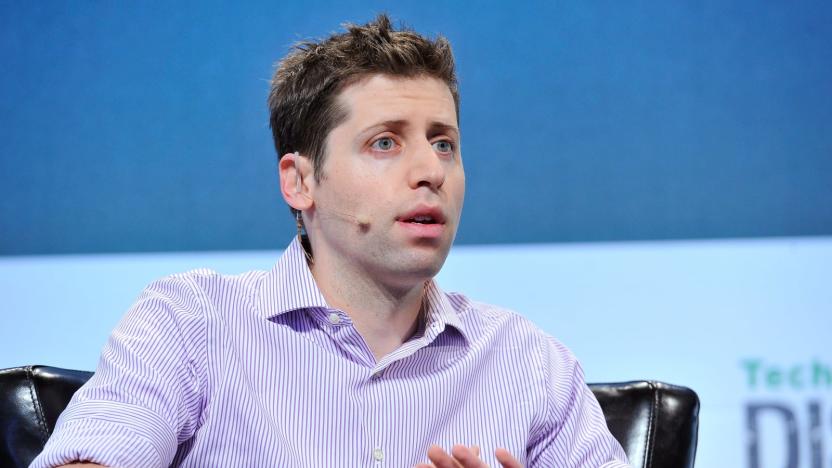YCombinator
Latest

Peter Thiel might be getting out of Silicon Valley
The Wall Street Journal reports today that Peter Thiel -- billionaire, investor and Gawker-killer -- might be cutting many of his ties with Silicon Valley. The paper spoke to sources it says are familiar with Thiel and his plans and they said that the shift is largely due to the Bay Area's left-leaning politics and what Thiel sees as its intolerance for conservative views. Supposedly, he's considering leaving Facebook's board and plans to move to Los Angeles. Thiel Capital and Thiel Foundation, companies that manage his investments, may also be relocated to LA.
Mallory Locklear02.15.2018
Tech incubator Y Combinator severs ties with Peter Thiel
It's safe to say that Peter Thiel's relationship with the tech industry has been... contentious. His wealth and willingness to invest have made him highly influential, but his eagerness to stifle media criticism and (at least for a time) support President Trump have put him at odds with a Silicon Valley culture that values things like immigration and renewable energy. However, it looks like he won't play as large a role as he once did. Gab and BuzzFeed News have discovered that Y Combinator, the primarily tech-focused startup incubator, quietly cut ties with Peter Thiel. His 2015 introductory post at Y Combinator now includes a message saying Thiel is "no longer affiliated" with the accelerator. It's not certain when this happened, but modifications to the post's web code last took place on October 30th.
Jon Fingas11.19.2017
The Engadget Podcast Ep 27: American Tune
Managing editor Dana Wollman and reviews editor Cherlynn Low join host Terrence O'Brien to discuss the biggest tech news of the week. First they'll debate OnePlus' benchmark scandal, then try to sort out why the ACLU is partnering with startup incubator Y Combinator and take the "artists" behind the Tinder for baby adoption Kickstarter to task. Finally it's another week of Trump talk as the panel addresses the impact of the recent immigration ban on the tech industry and how the political climate is impacting our social media habits.
Terrence O'Brien02.03.2017
ACLU signs on with Y Combinator after $24 million donation
The ACLU, in an average year, fundraises around $4 million. After stridently opposing Trump's unconstitutional immigration ban last weekend, the civil liberties watchdog was rewarded by the American public with a windfall of donations totalling $24 million -- six times its average annual income. On Tuesday, startup accelerator Y Combinator announced that the ACLU is enrolling as part of its Winter 2017 class to figure out how to best utilize this monetary windfall.
Andrew Tarantola01.31.2017
Track Trump will keep tabs on the President's first 100 days
President Trump was clear about the goals of his first 100 days in office before the election was even over, eventually laying out those goals in a PDF titled "Donald Trump's Contract with the American Voter." While Trump's policies can often be obscured by his tweetstorms and rhetoric, the folks behind Track Trump hope to cut out all the noise and make it easy to track those promises in a simple, non-partisan dashboard that will hold the new administration accountable for the promises they've made to the American voters.
Andrew Dalton01.20.2017
Project Include cuts ties with Y Combinator over Thiel and Trump
Project Include, a high-profile Silicon Valley diversity initiative, has officially cut ties with the influential Y Combinator venture incubator due to its ties to prominent Donald Trump supporter, Peter Thiel. The venture capitalist gave a speech at the Republican National Convention, and is reported to be offering a $1.25 million donation to Trump. Project Include cofounder Ellen Pao called it "a direct contribution to creating hate and instilling fear."
Mat Smith10.17.2016
Startup uses algorithms to fund civil lawsuits
It won't shock you to hear that many companies see lawsuits as opportunities for profit. Patent trolls base their entire businesses around it, after all. And now, they may use technology to help that happen. Legalist, a young startup, is trying to build on the litigation finance world (already a $3 billion field) by using algorithms to determine when a company should invest in someone else's lawsuit. The software compares a suit against 15 million historical cases to calculate the likelihood that a lawsuit will succeed. If the action is likely to pan out, Legalist funds the case in return for a cut (as much as 50 percent) of either the damage awards or the settlement.
Jon Fingas08.24.2016
How will you survive when the robots take your job?
The robots are coming, and they're taking our jobs. Or that's the concern, anyway. A recent Oxford University study surmises that over the next two decades, about 47 percent of U.S. jobs are at risk of being made obsolete thanks to automation. This isn't restricted to just blue-collar factory labor either; even office clerical duties and high-skilled work could eventually be done by computers and artificial intelligence. And if that happens, how will we make a living? Well, recently, a very old idea has gained momentum in Silicon Valley that aims to solve this very problem. The solution? Guaranteed income for everyone.
Nicole Lee08.19.2016
Y Combinator basic income test makes up for jobs lost to tech
Whether it's rational or not, there's a fear that the technology industry is stealing jobs, leaving people without a way to make a living. Startup accelerator Y Combinator thinks it might have a solution, however: give people a basic income. It's devising an experiment that tentatively gives 100 Oakland families a minimum wage as a way to compensate for tech-driven obsolescence. The 6- to 12-month dry run will offer $1,000 to $2,000 per month to people of various economic backgrounds (not just the unemployed) to see how it influences everything from education to recreation. Ideally, this baseline would both soften the blow of working less and give you a better chance at training for (or creating) a new career.
Jon Fingas06.01.2016
Inhabitat's Week in Green: Tesla's Model 3, and more!
After years of anticipation, Tesla just unveiled its most affordable electric car to date. The Model 3 is a svelte EV for the masses that starts at $35,000, and it can drive 215 miles on a single charge. Meanwhile, Hyundai set a world record by driving a hydrogen-powered car for 6,096 continuous miles. In other transportation news, India announced ambitious plans to become a 100 percent electric vehicle nation by the year 2030. A Colorado startup unveiled a supersonic jet that can travel from New York to London in three hours flat. And we rounded up nine of the best cargo bikes for carting around kids and goods in style.
Inhabitat04.03.2016
Coin stores info for multiple credit cards, aims to slim your wallet down (video)
What you see in the picture above promises to be the one credit card to rule them all. It's called Coin, and while it looks like any other traditional plastic, it's actually an electronic device that stores all your CC info in one package. Since Coin relies on data stored on its companion app, you'll need to scan your cards using the accompanying phone/tablet dongle and then take their pictures. When we asked its creators what prevents people from scanning someone else's plastics, a spokesperson told us the system only accepts those with the user's personal information. Now here's what's nifty: unlike NFC tech that requires special hardware, Coin will work with any credit card swiper. Also, it sends an alert to your phone if you stroll away with your frappuccino having left it on the counter. The bad news is that the device is not yet ready for center stage -- the startup, fresh out of YCombinator, seeks to raise $50,000 via crowdfunding for mass production. A Coin will retail for $100 when it becomes available -- the firm hopes to make its first shipment by summer 2014 -- but anyone willing to take a chance on the project can preorder one now for $50. As for those it's failed to charm, you can always wait for other advanced payment systems, like ones that use fingerprints and custom phone cases.
Mariella Moon11.14.2013
Gesture control startup Flutter acquired by Google, could make Gmail Motion a reality
Another day, another tech startup gets acquired. This time around it's Google snatching up Y Combinator-hatched Flutter, the developer of a gesture control app for Windows and Mac PCs. There's no word on what it's planning for the team and its technology -- we'd suggest 2011 April Fool's joke Gmail Motion, but someone beat them to that -- but the company's current product uses existing webcams to enable gesture control of software like Spotify, VLC or iTunes. According to CEO Navneet Dalal, users will continue to be able to use the app and should "stay tuned for future updates." Even after Kinect and all of the other gesture control entries we're not sure if it's the future, although creating a solution that has decent precision without requiring extra hardware is interesting. The company's founders told TechCrunch last year that they want Flutter to be the eyes of our computers the way apps like Siri or Google Now are the ears of our device, we'll see if teaming up with Google pushes that movement forward.
Richard Lawler10.02.2013
Insert Coin: the ixi-play robot owl monitors toddlers, helps them learn (video)
In Insert Coin, we look at an exciting new tech project that requires funding before it can hit production. If you'd like to pitch a project, please send us a tip with "Insert Coin" as the subject line. Isn't a baby monitor effectively a waste of technology? With a bit more thought and an operating system, couldn't it do much more with its components than just scope your infant? That's the premise behind Y Combinator-backed ixi-play, an Android-powered robot that just launched on the Crowdhoster crowdfunding platform. On top of Android 4.2, a dual-core ARM Cortex A9 CPU, 1GB RAM and a 720p camera, the owlish 'bot has face, card and object detection, voice recognition, a touch-sensor on the head, eye displays for animations, a tweeter/woofer speaker combo and child-proof "high robustness." For motion, the team adopted a design used in flight simulators, giving ixi-play "agile and silent" 3-axis translation and rotation moves. All that tech is in the service of one thing, of course: your precious snowflake. There are currently three apps for ixi-play: a baby monitor, language learning and animal-themed emotion cards. As the video shows (after the break), the latter app lets your toddler flash cards to the bot to make it move or emote via the eye displays, matching the anger or happiness shown on the card. In baby monitor mode, on top of sending a live (encoded) video stream to your tablet, it'll also play soothing music and sing or talk your toddler to sleep. The device will also include an SDK that includes low-level motion control and vision programming, providing a way for developers to create more apps. As for pricing, you can snap one up starting at $299 for delivery around July 24th, 2014, provided the company meets its $957,000 funding goal (pledges are backed by Crowdtilt). That's exactly the same price we saw recently for far less amusing-sounding baby monitor, so if you're interested, hit the source.
Steve Dent08.13.2013
Phi: a wireless re-routing card that puts you in control of the airwaves (video)
For all the talk of convergence in mobile devices, there's relatively little chatter about the coming together of wireless signals themselves. In other words, why should we have a separate device to interact with each type of wireless signal? And so, with that intriguing question, begins the pitch for a new device call Phi. It's a $750 antennae-laden PCIe card that slots into a desktop and gathers up wireless signals that are flying around the home -- so long as they have a frequency below 4GHz and don't involve bank-busting neutrinos. The card then allows custom apps to re-direct those transmissions as you like: potentially acting as a "base station" so you can make free calls from your cell phone, or receiving over-the-air HD transmissions which you can play on your tablet, or doing whatever else hobbyists and devs can cook up. Phi is still version 0.1 and Linux-only while the startup behind it -- Per Vices -- looks for a Kinect-style blossoming of third-party interest, but with nothing less than a deity-like command over the domestic ether on offer, how could it ever fail?
Sharif Sakr05.01.2012
Twitter snatches up Posterous, microblogging field about to get a little bit smaller
The Y Combinator-funded Posterous had its time in the sun and now it's being absorbed by the biggest player in the microblogging market. The simple sharing service struck a chord with many of Silicon Valley's elite, but it never managed to make a major dent in a field already dominated by the likes of Tumblr and its now owner, Twitter. The teams from Posterous will simply shift over to products at its new parent company and let their creation die a slow and likely unspectacular death. There are no concrete plans to retire Posterous Spaces just yet but, should that day come, we've been promised plenty of warning and instructions for backing up your content. Now we'll just have to wait and see what "key initiatives" Twitter has in store for its new employees.
Terrence O'Brien03.12.2012